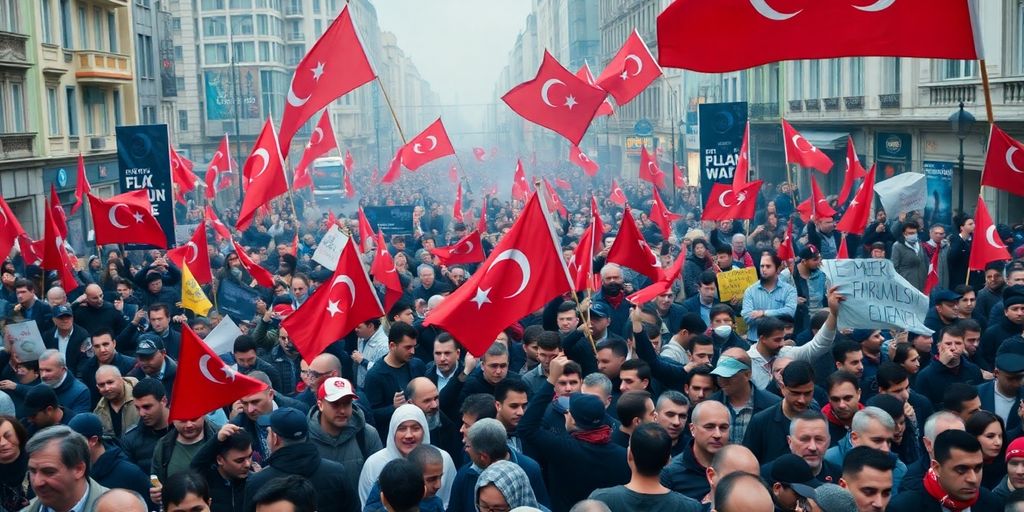Turkey is currently facing a significant political and economic crisis, sparked by the arrest of Istanbul Mayor Ekrem Imamoglu. This event has ignited widespread protests across the nation, challenging President Recep Tayyip Erdogan’s long-standing authority amid a deteriorating economic landscape.
Key Takeaways
- The arrest of Istanbul Mayor Ekrem Imamoglu has led to the largest protests in Turkey in over a decade, primarily driven by youth and students.
- Erdogan’s administration is grappling with a recession and soaring inflation, which has reached 48.6%.
- The opposition is calling for boycotts against businesses linked to Erdogan, intensifying the political struggle.
- The government has responded with crackdowns on protests and media, including the detention of journalists covering the unrest.
Background of the Crisis
In March 2025, Turkish authorities arrested Ekrem Imamoglu on charges of corruption and terrorism, which many view as politically motivated. Imamoglu, a prominent figure in the opposition Republican People’s Party (CHP), is seen as a serious contender against Erdogan in the upcoming 2028 presidential elections. His arrest has galvanized public sentiment, leading to protests in major cities like Istanbul, Ankara, and Izmir.
The protests have been characterized by a strong presence of young people, reflecting a generational divide in Turkish society. While older generations may still support Erdogan, the youth are increasingly vocal about their dissatisfaction with the current political and economic situation.
Economic Challenges Facing Turkey
Turkey’s economy has officially entered a recession, with a GDP contraction of 0.2% for two consecutive quarters. Inflation remains alarmingly high, forcing the central bank to maintain a key interest rate of 50% for several months. This economic turmoil has eroded public support for Erdogan’s government, creating a precarious situation for his administration.
The opposition has capitalized on this economic discontent by calling for boycotts of businesses that support Erdogan. This strategy aims to exert economic pressure on the government while mobilizing citizens who may be hesitant to participate in street protests.
Government Response and Crackdown
In response to the protests and the opposition’s boycott campaign, Erdogan has accused the opposition of sabotaging the economy. He has threatened legal action against those involved in the boycott, claiming it undermines national prosperity. The government has also intensified its crackdown on dissent, with reports of mass arrests, including nearly 2,000 individuals, many of whom are students.
Additionally, two investigative journalists were detained for their coverage of Imamoglu’s arrest, highlighting the government’s increasing intolerance for critical media. This crackdown on press freedom has drawn international condemnation and raised concerns about the state of democracy in Turkey.
Future Outlook
The current crisis presents several potential scenarios for Turkey’s political landscape:
- Continuation of Tension: Erdogan may attempt to manage the protests through limited repression and media control, hoping to wear down public dissent.
- Early Elections: Faced with mounting pressure, Erdogan could call for early elections, although the economic situation makes the outcome uncertain.
- Tactical Retreat: If international and domestic pressures escalate, Erdogan might release Imamoglu but continue to impose legal barriers to his presidential candidacy.
- Increased Repression: In a worst-case scenario, Erdogan could resort to harsher measures to suppress protests and further restrict media freedoms.
Conclusion
Turkey’s current crisis is a complex interplay of economic, political, and social factors. While Erdogan’s grip on power appears to be weakening, the outcome of this turmoil remains uncertain. The future of Turkey will depend on the government’s ability to navigate these challenges and the opposition’s capacity to maintain unity and pressure for change.






